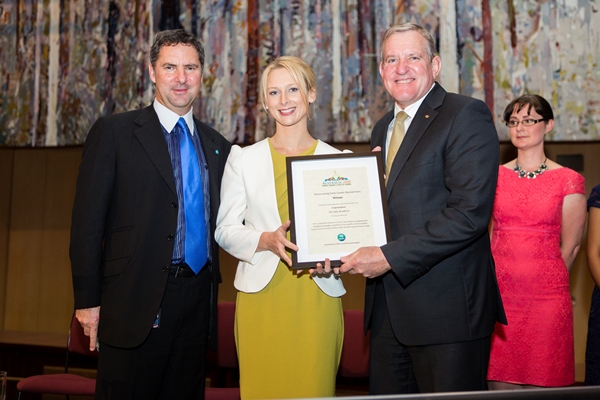Marcus Butler
1 July 2015: University of Canberra PhD candidate Sally Bradford is hoping to improve early intervention rates in mental health for young people with a mental health assessment app.
Ms Bradford's 'myAssessment' app was used in a headspace pilot trial at the University, asking initial questions of young people prior to their consultation with a psychologist or counsellor.
"The trial showed that young people were between two and ten times more likely to disclose information around a range of highly personal domains, such as substance use, sexual orientation and self-harm through app, rather than by traditional face-to-face conversations with clinicians," she said.
Ms Bradford was named the Cooperative Research Centres Association's 2015 early career researcher of the year for her work developing the mental health assessment app.
"This is about improving access to more and better information earlier on in a young person's experience of mental health, at a time when early intervention can do the most good."
"The real impact of this app could be that clinicians can respond to young people's mental health issues far faster, potentially saving lives," Ms Bradford said.
Now in the fourth year of her PhD, Ms Bradford's research looked at the growing habit of oversharing information via social media and digital technology, questioning whether such a tendency may benefit early diagnosis and intervention in addressing mental health.
"I wanted to find out if health professionals could integrate technology into current services to utilise the benefits of that technology, while still meeting young people's preference for face-to-face contact," Ms Bradford said.
"The online disinhibition effect has shown that people are more likely to disclose initial frequencies of behaviours in an online format, but care providers can access greater depth or breadth of understanding through follow-up conversations.
"Essentially, using technology for the initial screening of information will increase the likelihood of someone initially telling their whole story, rather than 'clamming-up' and avoiding honest answers," Ms Bradford said.
"I would hope that clinicians become increasingly accepting of this type of technology in their own practice and be aware that while their current therapeutic approach may not be 'broken,' it could be improved for some young people," Ms Bradford said.
Ms Bradford received a research scholarship from the Young and Well-CRC and her PhD research is associated with one of their ongoing projects.
Her work has been published in journals including Health, the Journal of Child and Family Studies and the Journal of Technology in Human Services.




